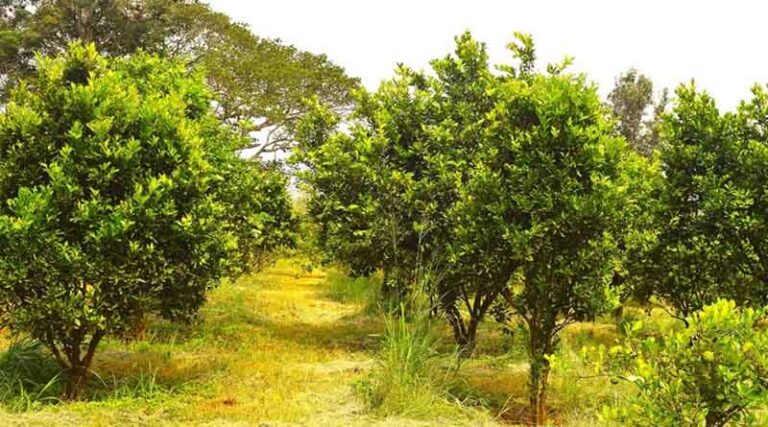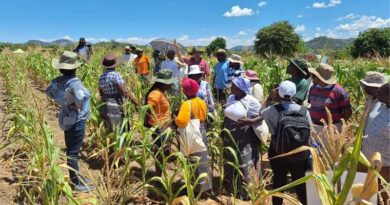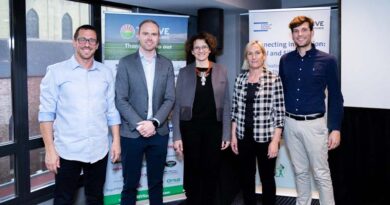
Mother Blocks Provide Seeds Of Hope For Ecosystem Restoration In Africa
By David Henry
24 July 2025, Africa: In East Africa, it is often said that the patient person eats ripe fruit (Mvumbika mbichi hula mbivu in Kiswahili).
This proverb could serve as a motto for the conservation of plant genetic diversity, a process that requires diligence, patience and years of meticulous care before farmers are able to reap the benefits in their fields.
Recently, scientists in Kenya took on the task of preserving the genetic foundations of certain tree species by establishing new “mother blocks” that can help boost ecosystem restoration efforts and improve livelihoods. Diverse plant varieties enable farmers to adapt to climate change, giving them more options to grow food and earn an income.
Mother blocks are field systems that nurture high-quality tree-planting material, especially for fruits. These small plots of land function as a genetic reservoir for planting stock used in forestry or agroforestry and are a key component of any initiative focused on the large-scale deployment of enhanced, high-quality trees.
In April 2025, tree-seed experts from the Center for International Forestry Research and World Agroforestry (CIFOR-ICRAF) partnered with the Kenya Agricultural & Livestock Research Organization (KALRO) to establish mother blocks in two Kenyan towns: Marigat (Baringo County) and Lanet (Nakuru County).
The initiative is part of the Quality Tree Seeds for Africa project, launched last year by CIFOR-ICRAF in partnership with the Bezos Earth Fund with the aim of boosting access to high-quality tree seed and enhancing tree-seed quality to support ecosystem restoration across Africa.
Diverse landscapes
In Kenya, the project supports 36 participants – also known as Restoration Champions – in diverse landscapes of the Great Rift Valley, which runs north to south through the country and is well known for its wide range of ecosystems and rich cultural heritage.
“We started by collecting information through surveys to find out the capacities that Restoration Champions would like to acquire,” says Sylvia Buleti, a research scientist at CIFOR-ICRAF and the project’s technical manager in Kenya. “During the surveys of tree nurseries belonging to the different restoration practitioners, we noted the inadequate capacity to produce and access quality seeds and other planting material. We then made the decision to establish mother blocks for citrus and guava.”
This decision followed a series of consultative meetings between CIFOR-ICRAF and KALRO scientists to ensure that national and county priorities were linked to the needs of farmers.
“Farmers are always having the major challenge of accessing high-quality, true-to-type planting materials of superior varieties of fruit crops like guava and citrus, which are developed by KALRO and its partners,” says Dr. Joseph Kori, director of the Horticulture Research Institute at KALRO.
Disease-free trees
With biodiversity facing a growing threat from deforestation, land degradation and the effects of climate change, mother blocks provide living collections of disease-free trees that supply cuttings, shoots and buds to produce resilient varieties of offspring.
These elite breeding grounds are especially important for conserving “recalcitrant” tree seeds – which cannot survive in cold storage without losing their viability. The mother blocks – sometimes called field genebanks – can also be used as demonstration plots for training and research, or to conserve “true to type” species, which produce trees through seeds that retain the mother plant’s specific characteristics and traits.
KALRO’s centres in the two counties provided the land used for the mother blocks, each of which is about 1.5 acres (0.6 hectare) in size with around 250 seedlings. In Marigat and Lanet, 11 varieties of citrus were planted, while two varieties of guava were planted from genetic material that CIFOR-ICRAF had originally sourced from South Africa. The establishment of mother blocks for avocados is now in the planning stages with a view to planting seedlings in both locations in the coming months.
“These mother blocks are supposed to act as future sources of planting material for the fruits, not just for the Restoration Champions but also for the community,” Buleti says. “We chose KALRO to be the host because it has the expertise to manage mother blocks, and because it is a government research organization, so the general public can have access to this planting material.”
Mother plants
Of course, mother blocks cannot be established without elite mother plants. According to a CIFOR-ICRAF Training Manual for Rural Resource Centres, mother plants should meet three criteria: (i) consistently high performance and yield over several years; (ii) healthy and free from diseases and pests; and (iii) appropriate quality parameters.
Trees selected for mother plants should be planted in a smaller space to ensure a continuous supply of shoots. Continuous maintenance and management of mother blocks are highly recommended to achieve the target of healthy, disease- and insect-free plants, according to the manual.
The Quality Tree Seeds for Africa project is scheduled to end in 2026. KALRO will then take over the management of these field genebanks to ensure their sustainability and to increase the reach to local farmers.
“To ensure this is achieved, KALRO and its partners will create awareness among farmers and nursery operators to source propagation materials from reputable sources, like the KALRO/CIFOR-ICRAF mother blocks, so that quality seedlings are guaranteed,” Dr. Kori says.
CIFOR-ICRAF will continue to offer its knowledge, materials and expertise accumulated through its own tree genebank, which holds 248 agroforestry tree species. About 7,020 accessions representing 195 species are conserved in its seed genebank, while 19,008 accessions consisting of 82 agroforestry tree species are stored in live field genebanks at 51 sites in 19 countries across Africa, Asia and Latin America.
The CIFOR-ICRAF genebank has been a main source of genetic material for Kenyan smallholders, who have found improved food security, higher incomes, increased milk production, reduced vulnerability to drought, reduced soil erosion, and enhanced soil fertility using tree species, such as Calliandra and Gliricidia.
“We have already taken a big step by getting the seedlings in the ground,” Buleti says. “They are growing in good time, so the project is on the right track.”
Also Read: Verdesian Life Sciences Appoints RK Goyal as Head of Asia Commercial Operations
📢 If You’re in Agriculture, Make Sure the Right People Hear Your Story.
From product launches to strategic announcements, Global Agriculture offers unmatched visibility across international agri-business markets. Connect with us at pr@global-agriculture.com to explore editorial and advertising opportunities that reach the right audience, worldwide.






